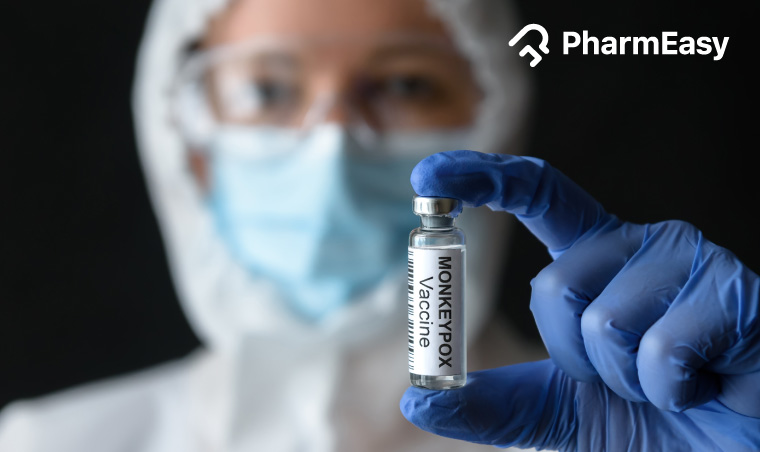Monkeypox Vaccine: All You Need To Know
By Saksham Bhatia +2 more

Get more insightful and
helpful tips to
treat Diabetes for FREE



Download PharmEasy App




Register to Avail the Offer
Send OTPBy continuing, you agree with our Privacy Policy and Terms and Conditions
By Saksham Bhatia +2 more
This article has been reviewed by Dr Nikita Toshi

Table of Contents
As monkeypox is spreading rapidly across the globe, the World Health Organisation has declared it a Global Health Emergency. While WHO has also maintained that the situation is unlikely to escalate into a pandemic, there are more than 16,000 confirmed cases in about 75 countries across the globe. India has recorded 4 cases of monkeypox too.
Monkeypox shows symptoms similar to smallpox; however, less severe. Primarily occurring in tropical rainforests of Africa, the disease is spreading due to international travel. The self-limiting disease lasts for about 2-4 weeks and the fatality ratio is about 3-6%.
Vaccines are the best way to build the body’s defences against any unknown disease or pathogen. Read ahead to know everything about monkeypox vaccines – the availability and effectiveness.
Since monkeypox is similar to smallpox, the same vaccine has been clinically proven to be about 85% effective in preventing monkeypox. If you have received the smallpox vaccination, the infection might be milder. There is no specific monkeypox vaccine available at the moment in India.
The rash with monkey pox may commonly appear as a pimple or a fluid filled blister with itchy symptoms.
Dr. Ashish Bajaj, M.B.B.S., M.D. in Clinical Pharmacology and Toxicology
It is recommended to get vaccinated with monkey box vaccine for people who have recently encountered the disease or have high chances of getting infected with monkey pox.Two doses at four weeks interval is the recommended schedule.
Dr. Ashish Bajaj, M.B.B.S., M.D. in Clinical Pharmacology and Toxicology
Mpox (formerly known as monkeypox) is caused by a virus that is related to the virus that causes smallpox. JYNNEOS is a 2-dose vaccine developed to protect against mpox and smallpox infections. People need to get both doses of the vaccine for the best protection against mpox. The second dose should be given 4 weeks after the first dose
Dr. M.G. Kartheeka, MBBS, MD(Pediatrics)
Currently, the global outbreak can affect anyone who is exposed to the virus. Prolonged close contact with infected animals, humans or their belongings can aid in the spread of infection. As the currently available vaccines are in limited supply, priority must be given to vaccinating those who are at immediate risk. Self-limiting, monkeypox causes fever, skin lesions and swollen lymph nodes. These infections often clear up in a few weeks without any medical intervention. Follow the safety measures to reduce your risk of exposure to the monkeypox virus.
https://www.cdc.gov/poxvirus/monkeypox/considerations-for-monkeypox-vaccination.html
https://www.vox.com/23197370/monkeypox-vaccine-questions-answered
https://www.nature.com/articles/d41586-022-01587-1
https://www.cdc.gov/poxvirus/monkeypox/considerations-for-monkeypox-vaccination.html
https://www.who.int/news-room/fact-sheets/detail/monkeypox
https://www.hindustantimes.com/india-news/monkeypox-no-plans-yet-to-get-vaccine-101658770866173.html
Disclaimer: The information included on this site is for educational purposes only and is not intended to be a substitute for medical treatment by a healthcare professional. Because of unique individual needs, the reader should consult their physician to determine the appropriateness of the information for the reader’s situation.
Comments